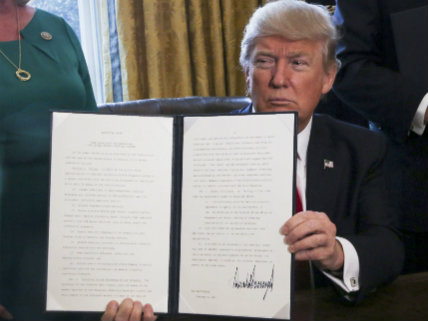Frankly, Trump's Plan To Review and Reform Dodd-Frank Makes a Lot of Sense
The president promises to prevent taxpayer-funded bailouts, and, hey, that makes sense too.

President Donald Trump concluded his second week in office by signing an executive order on Friday setting new guidelines for financial regulations and promising to roll back aspects of the Dodd-Frank Act, which gave government vast new powers to regulate financial markets in the wake of the 2008 economic crisis.
"Dodd-Frank is a disaster," Trump said earlier this week. "We're going to be doing a big number on Dodd-Frank."
While headlines at the New York Times and elsewhere on Friday suggested that Trump literally told Wall Street bankers that they now would be free to do anything they wanted, the reality of Trump's executive order is far simpler and less scary.
Rather than scrapping Dodd-Frank in a wholesale manner, Trump's order actually does little more than call for a review of Dodd-Frank. It also sets a series of, frankly, quite reasonable guidelines for the White House and executive agencies to follow as they work to restructure Dodd-Frank in the coming weeks and months.
In the order, Trump says he wants to "empower Americans to make independent financial decisions and informed choices in the marketplace," and wants to "foster economic growth and vibrant financial markets through more vigorous regulatory impact analysis." In other words, he wants the Treasury, the U.S. Department of Labor, and other executive branch departments to act with caution when issuing regulations that almost always come with unintended consequences.
Perhaps most importantly, and most welcome, of Trump's new regulatory guidelines is one that pledges to "prevent taxpayer-funded bailouts."
Passed in the wake of the financial collapse, Dodd-Frank did little to prevent future bailouts from taking place. In some ways, it reinforced the idea that government (ultimately, taxpayers) would be a backstop for banks that became "too big to fail."
"Part of the public dissatisfaction that drove Trump into office is a direct result of Washington's response to the financial crisis," wrote Mark Calabria, director of financial regulation studies at the Cato Institute, a libertarian think tank. "While big banks, along with the auto companies, were rescued, middle-class Americans were left picking up the tab."
Beyond the question of bailouts, reviewing and reforming the Obama administration's major financial regulation is something that absolutely should be done, and by no means does it require scrapping all of the law. Regulations stemming from Dodd-Frank have made it harder for smaller banks to comply with federal regulations, and, as Trump pointed out Friday, has made it harder for start-ups and other businesses to borrow, stunting growth of new firms.
"The Dodd-Frank so-called financial reform law has been a huge burden to community banks, credit unions, and consumers," said John Berlau, senior fellow at the Competitive Enterprise Institute, a Washington-based free market think tank, in a statement to Reason. "Directing financial regulatory agencies to ease the burden of implementation within the bounds of the law is a sensible action."
Congress, Berlau added, must do the important work of repealing the most burdensome aspects of Dodd-Frank.
One of the biggest fights will be over the future of the Consumer Financial Protection Bureau, the independent agency created as part of the Dodd-Frank law. Championed by Sen. Elizabeth Warren (D-Massachusetts), the CFPB was given wide authority to regulate financial institutions, supposedly in the interest of American consumers.
Republicans in Congress have opposed the agency since it was created and groups like CEI have encouraged Trump to replace Richard Cordray, director of the CFPB, with a pro-market head.
All of that will be sorted out in the weeks to come. For now, Trump's executive order on financial regulations seems like a straightforward effort at understanding the impact of one of the most complicated pieces of legislation passed during the previous administration—it's hardly cause for hyperventilating about deregulation on Wall Street.
Whether Trump would abide by his promise to avoid taxpayer-funded bailouts in the wake of another financial collapse is anyone's guess (and hopefully we'll never have to find out), but for now this is one of the few areas where libertarians can find agreement with the new president.


Show Comments (148)